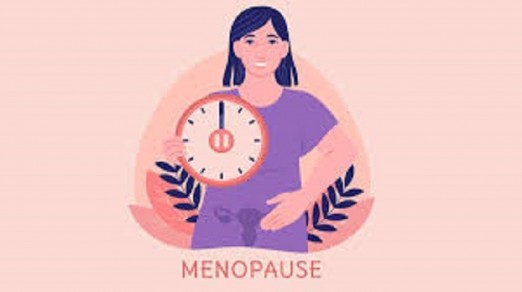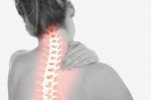What is menopause

February 6,Kathmandu. Women usually experience menopause at the age of 45 to 55 years. Menopause means that their periods stop. This is the stage in women's lives after which they cannot become biological mothers.
Usually the initial symptoms of menopause start appearing at the age of 40. These symptoms can start appearing anytime between 40 and 50.
Symptoms such as sudden sweating at night, restlessness and headaches can occur before, during and for several years after menopause. All of this is normal, but the hormonal imbalance caused by menopause increases the risk of heart disease, osteoporosis and UTI problems.
What is menopause?
If a woman is not having periods naturally for 12 months continuously, then it is considered menopause. However, due to this, one may have to face many physical and mental problems.
What are the symptoms of menopause?
Everyone can have different experiences due to menopause. It also has a great impact on emotional health. Usually, it increases fatigue and irritability. Stress can increase in this. Memory loss, anxiety and depression can also occur. Its symptoms are also seen on physical health.
What health complications can menopause cause?
During the menstrual cycle, estrogen and progesterone hormones are most active in the body of women. These play an important role in women becoming mothers. Also, they act as a protective shield for women and protect them from many diseases. During menopause, there is a decrease in these hormones in the body and when this protective shield is removed, the risk of many diseases increases.
Healthy lifestyle is helpful in dealing with the problems of menopause
For this, first of all take a healthy and balanced diet. Get enough sleep and manage stress. Many such changes in lifestyle can reduce the symptoms of menopause-
- Eat fruits and vegetables of all colors for plenty of vitamins and antioxidants.
- Eat milk, yogurt, cheese, soy and green leafy vegetables for calcium and vitamin D.
- Eat flax seeds, almonds and walnuts for omega-3 fatty acids.
- To avoid stress, do regular exercise, yoga and meditation.
- You can do cardio exercise and cycling to strengthen your heart and bones.
- Do stretching for body flexibility and relief from joint pain.
- If stress suddenly increases then take deep breaths or listen to your favourite music.
- Get adequate sleep of 8 hours daily and reduce screen time before sleeping.
- Drink at least 8-10 glasses of water daily for hydration and skin health.
- Take calcium, vitamin D, and magnesium supplements if recommended by your doctor.
What not to do
- Avoid caffeine and spicy foods. This can increase the problem of hot flashes and sudden sweating.
- Do not smoke and avoid alcohol consumption.
- Don't allow too much screen time. This increases stress and affects sleep.
How will you know that menopause is starting now?
Menopause does not happen suddenly. The period of perimenopause can last for 7-8 years before menopause occurs. In this, periods gradually become irregular. Sometimes there can be more or less bleeding. Sometimes the gap between two periods increases or decreases. The duration of the period can also be less or less.
There are no exact symptoms of this. But any kind of irregularity in the period cycle after the age of 40 is a sign that you are going into the perimenopausal state. Apart from this, the following symptoms can be seen-
- Hot flashes
- Sudden sweating at night.
- Mood changes.
- Increase in stress and anxiety.
Can someone experience menopause at the age of 30?
This happens in rare cases. Generally, menopause occurs at the age of 45 to 55 years. However, this can happen due to the treatment of some health conditions or serious diseases like cancer. These treatments can cause these problems-
- Chemotherapy
- Radiation Therapy
- Pelvic Injuries
- any major surgery
Can menopause cause long term health problems?
Yes, menopause can cause health problems. For example, blood pressure may increase, cholesterol level may increase. The risk of heart disease may increase. Due to the decrease in estrogen in the body, calcium absorption decreases, due to which bones start weakening. Therefore, the risk of health conditions like osteoporosis increases.
Can one remain sexually active after menopause?
Yes, one can remain sexually active even after menopause. However, due to hormonal changes, sometimes the desire may decrease. Also, vaginal dryness increases. The risk of infection and UTI increases. Therefore, it is important to take some precautions.
How can I manage the symptoms of menopause?
Hormone replacement therapy (HRT) can reduce symptoms such as hot flashes and sudden sweating at night. Also, a healthy lifestyle is also helpful.
What is hormone replacement therapy (HRT)?
Hormone replacement therapy (HRT) is a clinical treatment. It is usually used to manage the symptoms of menopause and correct the hormonal imbalances caused by it.
When menopause occurs, the estrogen and progesterone hormones disappear. Therefore, in hormone therapy, these hormones are given artificially.
Is hormone replacement therapy (HRT) completely safe?
Yes, hormone replacement therapy (HRT) is safe in most cases. Despite this, take any treatment or medicine only after consulting a doctor.
Taking HRT for a long time can cause these problems-
- There may be a risk of blood clotting.
- There may be problems related to the gallbladder.
- There may be problem of high blood pressure.
- The risk of stroke and breast cancer may increase.
Share this with your friends:
प्रत्येक महिला पुरुषभन्दा कमजोर छैनन् : कमला भासिन
 नरेश ज्ञवाली ►
भदौ २७, काठमाडौं। दक्षिण एसियामा लैङ्गिक समानता, शिक्षा, गरिबी निवारण, मानवअधिकार र शान्तिका...
नरेश ज्ञवाली ►
भदौ २७, काठमाडौं। दक्षिण एसियामा लैङ्गिक समानता, शिक्षा, गरिबी निवारण, मानवअधिकार र शान्तिका...
पुरुष कलमले पूर्ण नारीलाई लेख्न सक्दैन
 काठमाडौं। मान्छेहरू कडा भएर बोलेको भन्दा नरम भएर बोलेको मनपर्छ । खरा कुराभन्दा नरम, सरस र सलिल कुराहरू मनपर्छ । तर...
काठमाडौं। मान्छेहरू कडा भएर बोलेको भन्दा नरम भएर बोलेको मनपर्छ । खरा कुराभन्दा नरम, सरस र सलिल कुराहरू मनपर्छ । तर...
कालो तिलले कम्मर दुखेको र अनुहारमा भएको पोतोको उपचार गर्छ
 काठमाडौं । कालो तिल अथवा तिलबाट प्राप्त हुने बिऊ तेल उत्पादनको लागि प्रयोग गरिन्छ । अनुहारमा चायाँ, पोतो वा दाग,...
काठमाडौं । कालो तिल अथवा तिलबाट प्राप्त हुने बिऊ तेल उत्पादनको लागि प्रयोग गरिन्छ । अनुहारमा चायाँ, पोतो वा दाग,...
दुबईमा पहिलो पटक नेपाली कल्चरल पहिरनको फेसन शो सम्पन्न
 काठमाडौं। गत माघ २८ गते दुबईमा नेपाली कल्चरल पहिरनको फेसन शो पहिलो पटक फेसन फ्युजन २०१७ सम्पन्न भयो । एनआरएन...
काठमाडौं। गत माघ २८ गते दुबईमा नेपाली कल्चरल पहिरनको फेसन शो पहिलो पटक फेसन फ्युजन २०१७ सम्पन्न भयो । एनआरएन...
उमेर अनुसारको हुनुपर्छ खान्की, अनि मात्र मानिस स्वस्थ रहन्छ
 काठमाडौं। पोषणको आवश्यकता उमेरअनुसार परिवर्तन हुन्छ । उमेरको हरेक अवस्थामा स्वयंलाई स्वस्थ राख्न शरीरलाई...
काठमाडौं। पोषणको आवश्यकता उमेरअनुसार परिवर्तन हुन्छ । उमेरको हरेक अवस्थामा स्वयंलाई स्वस्थ राख्न शरीरलाई...
यी भोजन खाए छाला सुन्दर हुन्छ !
 काठमाडौं। स्ट्रबेरी : यो भिटामिन सीले भरपुर हुन्छ । भिटामन सीले छालालाई चाउरीबाट जोगाएर सधैं जवान राख्न मद्दत...
काठमाडौं। स्ट्रबेरी : यो भिटामिन सीले भरपुर हुन्छ । भिटामन सीले छालालाई चाउरीबाट जोगाएर सधैं जवान राख्न मद्दत...
मुलुकका सम्मानित पदमा महिलाको उपस्थिति, सबैका लागि आशाको ढोका उघारे
 काठमाडौं। अहिले नेपालका तीनवटै अंगका प्रमुख महिला भएकाले नेपाली राजनीतिक क्षेत्रमा मात्र नभएर सामाजिक...
काठमाडौं। अहिले नेपालका तीनवटै अंगका प्रमुख महिला भएकाले नेपाली राजनीतिक क्षेत्रमा मात्र नभएर सामाजिक...
लोग्नेमान्छेको जात केटी देखेपछि.....
 काठमाडौं । शान्ताको विवाह भएको पाँच वर्ष बितिसक्दा पनि छोराछोरी भएनन् बरु उनलाई एकाएक ब्लड क्यान्सर भयो । समयले...
काठमाडौं । शान्ताको विवाह भएको पाँच वर्ष बितिसक्दा पनि छोराछोरी भएनन् बरु उनलाई एकाएक ब्लड क्यान्सर भयो । समयले...
मनोसामाजिक समस्या के हो?
 साउन ११, काठमाडौं । मनोसामाजिक समस्या भन्नाले मन र समाज वीच हुने समस्या हो । यो जो कोही व्यक्तिलाई पनि हुन सक्छ ।...
साउन ११, काठमाडौं । मनोसामाजिक समस्या भन्नाले मन र समाज वीच हुने समस्या हो । यो जो कोही व्यक्तिलाई पनि हुन सक्छ ।...
महिलाको दोस्रो विवाहको कुरा सुन्दा पढेलेखेकैले अनुहार बिगार्छन्
 काठमाडौं। दोस्रो विवाहबारे मैले नसोचेको, नचाहेको होइन । तर, म मेरा आत्मीयसँग फेरि विवाह गर्नेबारे कुरा गर्छु,...
काठमाडौं। दोस्रो विवाहबारे मैले नसोचेको, नचाहेको होइन । तर, म मेरा आत्मीयसँग फेरि विवाह गर्नेबारे कुरा गर्छु,...










